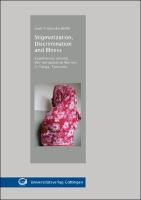Stigmatization, discrimination and illness
Author(s)
Bohle, Leah Franziska,
Collection
AG UniversitätsverlageLanguage
EnglishAbstract
“She was given her own plate, her own cup, everything of her own, even when she just touched a cloth then nobody wanted to touch it again.” (Halima, HIV-seropositive) The book sheds light on the profound influence of an HIV-seropositive diagnosis on the lives of women and their social environment in the United Republic of Tanzania. The author, a medical doctor and social anthropologist, tells the story of six Tanzanian HIV-seropositive women, focusing on their negotiation and perception of illness and disease. Furthermore, the high levels of discrimination and stigmatization in the context of HIV-seropositivity that they experience are presented in detail, weaving together the impacts of an HIV-seropositive diagnosis with results analyzed both from a Medical Anthropology and Public Health perspective. Despite a new era of antiretroviral treatment, available in Tanzania free of cost, that has given cause for hope in a change in how the disease is perceived, the book impressively underlines that being HIV-seropositive remains a great challenge and heavy burden for women in Tanzania. “She was given her own plate, her own cup, everything of her own, even when she just touched a cloth then nobody wanted to touch it again.” (Halima, HIV-seropositive) The book sheds light on the profound influence of an HIV-seropositive diagnosis on the lives of women and their social environment in the United Republic of Tanzania. The author, a medical doctor and social anthropologist, tells the story of six Tanzanian HIV-seropositive women, focusing on their negotiation and perception of illness and disease. Furthermore, the high levels of discrimination and stigmatization in the context of HIV-seropositivity that they experience are presented in detail, weaving together the impacts of an HIV-seropositive diagnosis with results analyzed both from a Medical Anthropology and Public Health perspective. Despite a new era of antiretroviral treatment, available in Tanzania free of cost, that has given cause for hope in a change in how the disease is perceived, the book impressively underlines that being HIV-seropositive remains a great challenge and heavy burden for women in Tanzania.
Keywords
HIV; Women; Tanzania; Social Environment; Public Health; Discrimination; HIV/AIDS; Infection; Medical anthropology; Serostatus; Tanga; TanzaniaDOI
10.17875/gup2013-289ISBN
9783863951085OCN
1030817448Publisher
Universitätsverlag GöttingenPublication date and place
2013Classification
Society and Social Sciences
Medicine and Nursing
Personal and public health / health education


 Download
Download